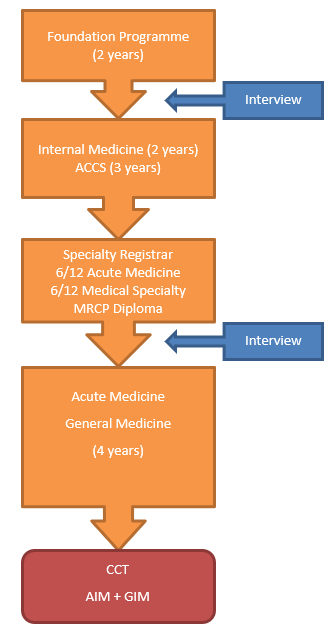A Career in Acute Medicine
Acute (Internal) Medicine is a new hospital specialty dedicated to the assessment, diagnosis and treatment of adults with urgent medical needs, focusing on the care of adult medical patients in the first 72 hours of their hospital admission.
Acute Medical care is multi-faceted including looking after acute unwell patients on Acute Medicine Units (AMU), Medical Short Stay wards as well as Emergency Department in-reach and in Ambulatory Emergency Care (AEC).
This involves the care of a broad range of patients from the acutely unwell within monitored areas to well patients in Ambulatory Care Areas (or SDEC, Same Day Emergency Care).
The presence of Acute Physicians in hospitals with unscheduled care has been shown to reduce mortality and length of hospital stay without increasing readmission rates.
The drive towards consultant-led acute services 7 days a week means there will be an increasing number of Acute Physicians delivering high quality care at the front door. To compensate working evenings and weekends consultants will have time off during the week.
The number of conditions managed by ambulatory care will increase as will the number of complex medical admissions, thus the skills of an Acute Physician will continue to be in high demand.
Acute Internal Medicine (AIM) is the fastest growing medical specialty in the UK.
What makes a good Acute Physician?
- Enjoyment of a wide range of medical problems
- Problem-solving, ability to think on your feet
- Desire to manage acutely unwell patients
- Ability to interface with other specialties
- Good team-working and communication skills with patients, carers and the multidisciplinary team
- Leadership qualities and a desire to innovate are desirable
How can i train in Acute Medicine?

To become an acute physician you will need to first complete foundation programme training and then apply for one of the pre-specialty medical training programmes:
- Internal Medical Training (IMT) – 2 years
- Acute Care Common Stem (ACCS) – 3 years
Following this you will need to complete your IMT3/ST3 year and, similar to all medical specialties, successfully complete the MRCP(UK) Examination. Following this you will be eligible to apply for Acute (Internal) Medicine training and enter at ST4 level.
At the end of training trainees will receive a Certificate of Completion of Training (CCT) in both Acute Internal Medicine and General Internal Medicine.
The Acute Internal Medicine Curriculum
The AIM curriculum (2009), in conjunction with the 2009 General Internal Medicine curriculum allows trainees to achieve a joint CCT in both General Internal Medicine and Acute Internal Medicine.
The new AIM curriculum defines the need to develop and expand trainee's competencies through the duration of training. The trainee builds on these core competencies, as they acquire skills in the treatment and management of complex acute medical problems in the in-patient setting and also acquire advanced practical skills that are directly relevant to the practice of acute medicine.
Furthermore, the specific management, organisational and leadership competencies for the Acute Physician are well defined, including the need to review patient pathways and to develop different management strategies for acute medical problems including the development and implementation of protocols to manage patients wholly within ambulatory care units.
The Acute Medicine Curriculum is currently in the process of being reviewed and due to be published shortly (the draft is available here).
Acute Internal Medicine Training in the West Midlands
There are a wide variety of centres offering a broad set of specialist skills
- Multiple opportunities for regional trainee-led research collaborative - The West Midlands Acute Medicine Collaborative
- Monthly training days are organised by trainees at the base hospitals allowing a bespoke training experience mapped to the Acute Medicine Curriculum
- Regular social events
During your 4 years of specialty training you will rotate through 4 different hospitals, and requests for specific sites will always be taken into consideration alongside your training needs. All placements are primarily based on the Acute Medical Unit of that hospital.
In each year you will complete one four-month placement in one of the four core specialties – cardiology, geriatrics, intensive care and respiratory medicine.
All trainees will be given time to train in ultrasound in their first two years, achieving FAMUS (Focused Acute Medicine Ultrasound) accreditation. Trainees will be given 1 day (or 2 sessions) toward this; this time should also be used to produce high quality Quality Improvement Projects.
All trainees will also train in a Sub-specialty Skill (see JRCPTB for full list of options) within their non-clinical time.
Consultants within the West Midlands have a broad range of specialist skills including Medical Leadership, Critical Care Medicine, Clinical Toxicology, Endoscopy, Obstetric Medicine, Palliative Medicine, Echocardiography, Ultrasound, Stroke Medicine, Medical Education and Simulation Training. University courses will be funded by Health Education England once prospectively approved by the Training Committee.
You will also need to complete the Acute Medicine Specialty Certificate Examination during your 4 years as a Specialty Registrar. Sitting for the examination is once per year, at present this is in the Autumn.
There will be the opportunity to take an Out Of Programme Training experience should you wish to pursue teaching, leadership, management or research interests. Trainees can also choose to dual accredit in Intensive Care or other subspecialties such as stroke medicine, clinical toxicology or prehospital emergency medicine (subject to local competitive appointment processes).
Many Acute Medicine trainees have successfully applied to be the Chief Registrar within their Hospital Trusts in the West Midlands.
Acute Medicine: Key Links
Acute Internal Medicine and General Internal Medicine Curricula
Gold Guide – a reference guide for postgraduate specialty training
Joint Royal Colleges of Physicians Training Board
Society for Acute Medicine - the national representative body for staff caring for medical patients in the acute hospital setting
Page Last Updated 13th July 2021